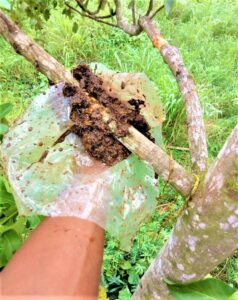After a 2-month training on vegetative tree propagation, crop seed multiplication, acclimatization and out planting amongst others, some four community youths within the Buea Municipality have begun marcotting tropical fruit trees.
The training, which took place from April to June 2020, organized by Ecological Balance within the framework of the Irvingia project sought to maximize farmers’ income and render them resilient to fluctuating market prices. To speed up the realization of the project goal, the four agile youths who are already gainfully putting the skills acquired into practice, are expected within the next two months, to train at least 25 more farmers on various techniques and processes in forest gardening.

Forest gardening, which involves integrating trees and animals into already existing farms according to the Executive Director of Ecological Balance, Limbi Blessing, will optimize the use of resources within farm lands by maximizing the use of both horizontal and vertical space. “Integrating trees, crops and animals on the same piece of land is a combination that maximizes beneficial interactions and minimizes negative effects on each other to produce a variety of products (food, meat, milk, non-timber products, timber etc). It also enhances environmental services while at the same time reducing dependence on wild sources,” she expounded. The Eco-balance boss added that through forest gardening, soil nutrients are actively being added (organic) and efficiently recycled, which makes it possible for farms to be cultivated for longer time periods thus, reducing the rate of shifting cultivation.
Funded by the Leopold Bachmann Foundation through Kanthari Switzerland Foundation, the forest gardening initiative is meant to train at least 25 rural women on the sustainable growing of non-timber forest products. It should be noted that marcotted seedlings cost three times more and bear fruits at half the time.







